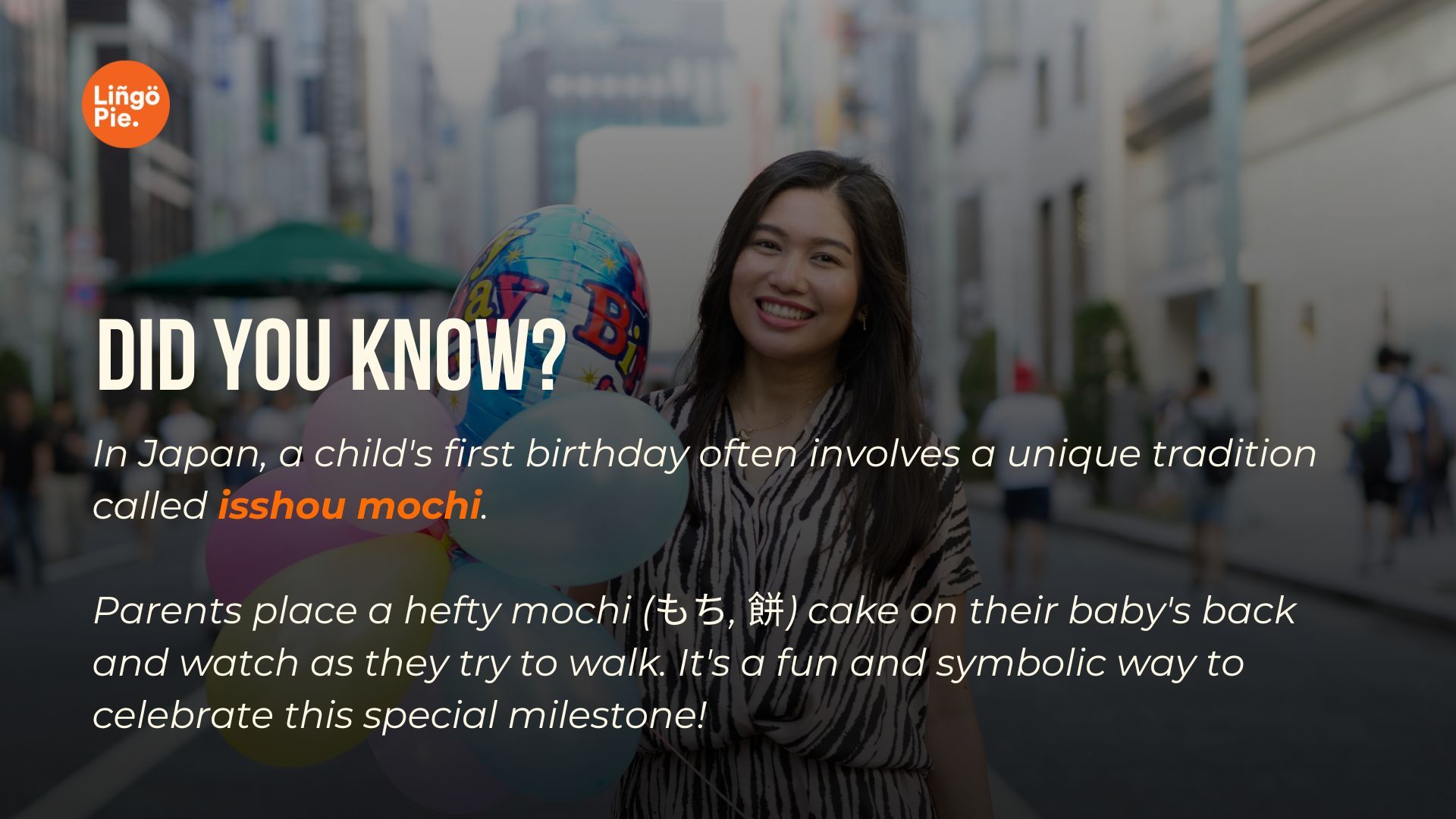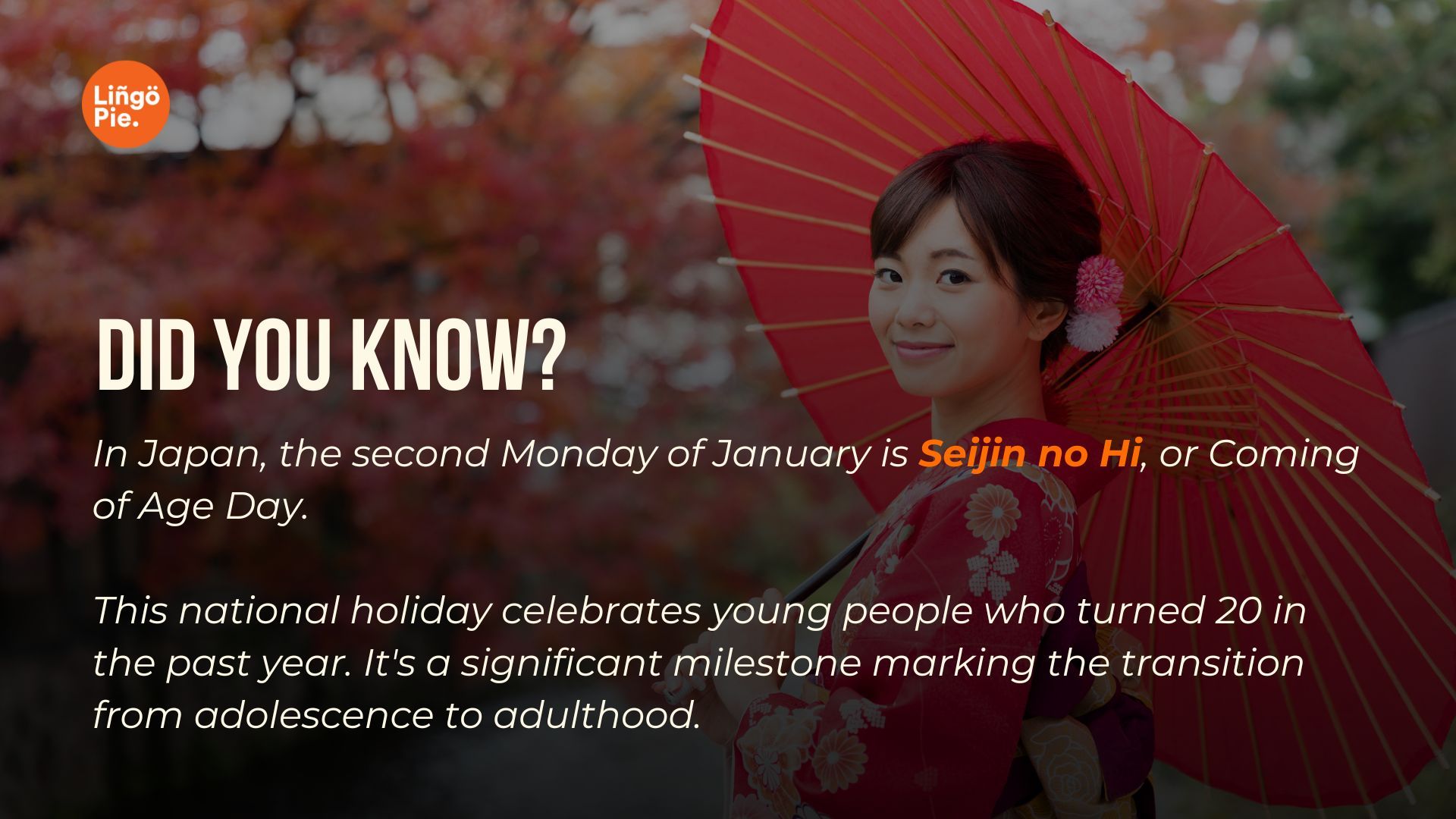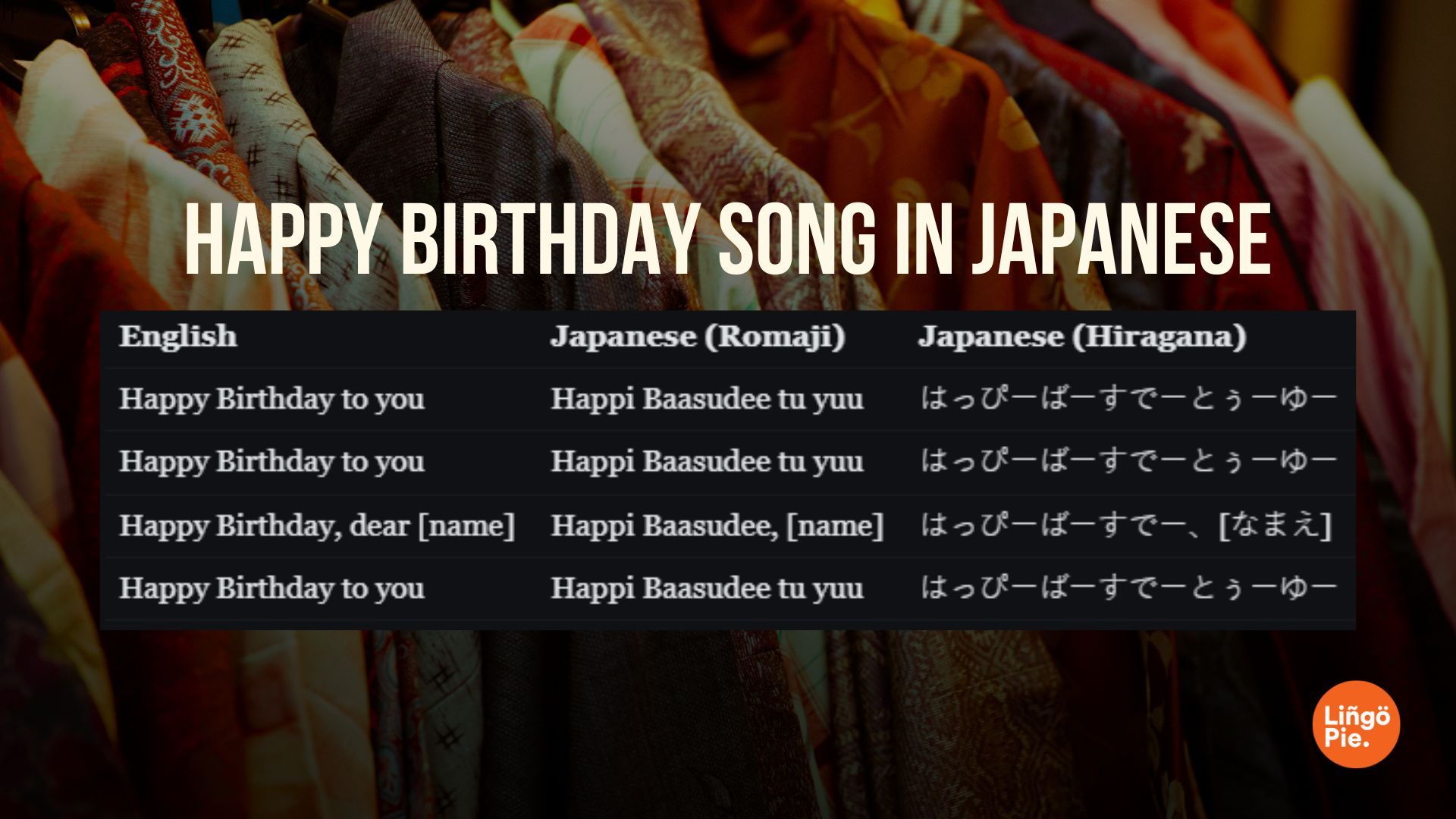As someone who spent two unforgettable years teaching English in Japan through the JET Programme, I've had the joy of celebrating countless birthdays with my Japanese friends and students. One of my fondest memories? Well, that would be the first time I attempted to wish my colleague Yuki a happy birthday in Japanese.
Let's just say my pronunciation was... interesting.
But you know what? The huge grin on her face made my awkward attempt totally worth it. That's when it hit me – learning to say Happy Birthday in Japanese isn't just about nailing the words. It's actually about the heartfelt connection they create.
In this article, I'm going to spill the beans on over seven easy ways to say "Happy Birthday" in Japanese. Trust me, by the end of this, you'll be dropping birthday wishes like a local! Let's get started, shall we?
Sidenote: This post is the latest in our "Happy Birthday" series, where we explore the best ways to wish someone a wonderful birthday in different languages. You can read more posts here:
Happy birthday in Punjabi
Happy birthday in Arabic
Happy birthday in Korean

How To Say Happy Birthday In Japanese
Ready to make someone's birthday extra special? Let's dive into these Japanese birthday greetings!
お誕生日おめでとうございます – Otanjoubi omedetou gozaimasu
It's the most polite way to say "Happy Birthday," and it's your go-to when you want to show respect or when you're not super close with the birthday person.
Let's break it down:
- お誕生日 (otanjoubi) means "birthday"
- おめでとう (omedetou) means "congratulations"
- ございます (gozaimasu) is a polite suffix that elevates the whole expression
This phrase is a perfect example of keigo (敬語), the Japanese language's system of polite speech. If you've ever used ありがとうございます (arigatou gozaimasu) to say "thank you very much," you're already familiar with how ございます works to make things extra polite.
In my experience, this is best used when you want to err on the side of formality like during work interactions or when speaking with someone older or of higher authority.
お 誕生 日 おめでとう – Otanjoubi omedetou
お 誕生 日 おめでとう (Otanjoubi omedetou) is the standard, casual way to say "Happy Birthday" in Japanese. It's perfect for friends and family. Think of it as the equivalent of a warm, friendly "Happy Birthday!" in English.
When to use it:
- With your buddies
- Talking to classmates or coworkers you're close with
- Family gatherings
- Any situation where you don't need to be overly formal
Pro tip: Using this version with people who you want to be really close with can also show that you're comfortable with them and understand the nuances of Japanese social dynamics.
ハッピーバースデー – Happii baasudee
This phrase is super popular, especially with the younger crowd. When I was teaching in Japan, I heard my students use it all the time. It's written in katakana alphabet script (those blocky characters for foreign words), but get this - on social media, kids often just type "Happy Birthday" in the regular Roman Alphabet.
[数字]-歳のお誕生日おめでとう - [Number]-sai no otanjoubi omedetou
This phrase is your go-to when you want to give a shout-out to someone's specific age. It's like saying "Happy 30th birthday!" instead of just "Happy birthday!" in English. Here's how it works:
- Replace [数字] with the person's age in Japanese.
- Add 歳 (sai) after the number.
- Finish with のお誕生日おめでとう (no otanjoubi omedetou).
For example:
- 20歳のお誕生日おめでとう (Hatachi no otanjoubi omedetou) - Happy 20th birthday!
- 30歳のお誕生日おめでとう (Sanjussai no otanjoubi omedetou) - Happy 30th birthday!
Quick tip: Even though we're talking about ordinal birthdays (1st, 2nd, 3rd), we use cardinal numbers here. So it's いっさい (issai) for 1, にさい (nisai) for 2, さんさい (sansai) for 3, and so on.
誕生日おめでとう - Tanjoubi omedetou
In this phrase, we've dropped the polite お (o) from the beginning of 誕生日 (tanjoubi). According to my Japanese friends and co-teachers, this basic birthday greeting is a great way to show you're like best friends with the celebrant. Just make sure you're actually close enough to the person before dropping the formalities!
おたおめ (Ota ome)
This super-short phrase is a condensed version of おたんじょうびおめでとう (otanjoubi omedetou). It takes the おた (ota) from おたんじょうび (otanjoubi) and the おめ (ome) from おめでとう (omedetou), smooshing them together to create this snappy Japanese birthday party greeting!
When to use it:
- Online, especially in texts or social media
- With young, close friends
- When you want to sound extra casual and cool
Remember, this is seriously informal. Don't use it with anyone older or in any remotely formal situation. It's perfect for a quick birthday text to your bestie, but probably not for your Japanese teacher!
おめでとう- Omedetou
Need something really simple? This versatile greeting is actually not just for birthdays - use it for any congratulatory moment since its direct translation is "congrats" in the Japanese language.
長寿を祈ります – Chouju o inorimasu
This elegant phrase literally means "I pray for your long life." It's a beautiful way to extend birthday wishes to older adults in Japanese culture. What I perosnally noticed is that this is best used when celebrating a milestone birthday for older adults.
遅くなったけど、お誕生日おめでとう - Osoku nattakedo, otanjoubi omedetou
This phrase is your go-to for belated birthday wishes in Japanese. It literally translates to "Happy belated birthday" The first part, "Osoku nattakedo," means "Although it's become late," and it's the key to turning any birthday wish into a belated one.

Japanese Birthday Vocabulary
Now that you've got those cool Japanese birthday greetings down, why stop there? To really dive into the world of Japanese birthday celebrations, let's beef up your vocab.
| English | Japanese Script | Japanese Romanization | Pronunciation Guide | Usage Example |
|---|---|---|---|---|
| Birthday | 誕生日 | Tanjoubi | tan-joh-bee | 今日は私の誕生日です。(Kyou wa watashi no tanjoubi desu.) - Today is my birthday. |
| Birthday party | 誕生日パーティー | Tanjoubi paatii | tan-joh-bee pah-tee | 誕生日パーティーを計画しています。(Tanjoubi paatii wo keikaku shiteimasu.) - I'm planning a birthday party. |
| Birthday cake | バースデーケーキ | Baasudee keeki | bah-su-dee keh-ki | バースデーケーキを買いました。(Baasudee keeki wo kaimashita.) - I bought a birthday cake. |
| Candle | ろうそく | Rousoku | roh-so-ku | ろうそくを吹き消してください。(Rousoku wo fukikeshite kudasai.) - Please blow out the candles. |
| Present/Gift | プレゼント | Purezento | pu-re-zen-to | プレゼントを開けてもいいですか?(Purezento wo akete mo ii desu ka?) - Can I open the present? |
| Birthday song | 誕生日の歌 | Tanjoubi no uta | tan-joh-bee no oo-ta | 誕生日の歌を歌いましょう。(Tanjoubi no uta wo utaimashou.) - Let's sing the birthday song. |
| To blow out (candles) | 吹き消す | Fukikesu | foo-ki-ke-su | ろうそくを吹き消す時に願い事をしてください。(Rousoku wo fukikesu toki ni negaigoto wo shite kudasai.) - Make a wish when you blow out the candles. |
| To make a wish | 願い事をする | Negaigoto wo suru | ne-gai-go-to wo su-ru | 誕生日に何を願い事をしましたか?(Tanjoubi ni nani wo negaigoto wo shimashita ka?) - What did you wish for on your birthday? |
| Surprise party | サプライズパーティー | Sapuraizu paatii | sa-pu-rai-zu pah-tee | 友達のためにサプライズパーティーを準備しています。(Tomodachi no tame ni sapuraizu paatii wo junbi shiteimasu.) - I'm preparing a surprise party for my friend. |
| Age | 年齢 | Nenrei | nen-rei | 年齢を聞くのは失礼かもしれません。(Nenrei wo kiku no wa shitsurei kamo shiremasen.) - It might be rude to ask about age. |

Special Japanese Birthday Celebrations
Japan places great importance on numbers and birthdays. Certain ages are considered especially significant, reflecting cultural values, traditions, and numerical symbolism. These special birthdays, known as "Toshi Iwai" (年祝い), mark important milestones throughout life.
| Age | Japanese Name | Significance |
|---|---|---|
| 1 | Isshou Mochi | First birthday ritual with rice cakes |
| 3 | Shichi-Go-San | Shrine visit for girls and boys |
| 5 | Shichi-Go-San | Shrine visit for boys |
| 7 | Shichi-Go-San | Shrine visit for girls |
| 20 | Hatachi | Coming of age, official adulthood |
| 60 | Kanreki | Completion of zodiac cycle, symbolic rebirth |
| 77 | Kiju | "Joy" birthday |
| 88 | Beiju | "Rice" birthday |
| 99 | Hakuju | "White" birthday |
| 100 | Hyakuju | Centennial celebration |
Each of these birthdays involves unique customs and celebrations, highlighting their importance in Japanese culture.

Happy Birthday Song In Japanese
Surprising a Japanese friend with the Happy Birthday song in their native language is a delightful way to celebrate their special day. While Japan has embraced the familiar Western melody, they've cleverly adapted the lyrics to suit their language.
Let's break down the lyrics and their pronunciation to help you sing along!
| English | Japanese (Romaji) | Japanese (Hiragana) |
|---|---|---|
| Happy Birthday to you | Happi Baasudee tu yuu | はっぴーばーすでーとぅーゆー |
| Happy Birthday to you | Happi Baasudee tu yuu | はっぴーばーすでーとぅーゆー |
| Happy Birthday, dear [name] | Happi Baasudee, [name] | はっぴーばーすでー、[なまえ] |
| Happy Birthday to you | Happi Baasudee tu yuu | はっぴーばーすでーとぅーゆー |
Usage Tips:
- Replace [name] with the birthday person's name.
- Pronounce each syllable clearly, especially the elongated sounds like "baasu" and "yuu".
- Practice a few times before the big moment to ensure smooth delivery.
- Remember, it's the thought that counts – your Japanese friends will appreciate the effort even if the pronunciation isn't perfect!
Learn Japanese With Lingopie
Learning to say "Happy Birthday" in Japanese is just the beginning of understanding the rich birthday traditions in Japanese culture. To deepen your knowledge and appreciation, consider exploring Japanese TV shows and movies that often feature birthday celebrations.
By watching these shows, you'll not only improve your language skills but also gain a more nuanced understanding of Japanese social norms and values surrounding birthdays.
For those eager to dive deeper into Japanese language and culture, Lingopie offers a vast library of authentic Japanese content. And by content, we literally mean the best movies and TV shows straight from Japan!
With hundreds of clips featuring real-life scenarios, including birthday celebrations, Lingopie provides an immersive way to learn Japanese in context. Tuning into these Japanese movies and shows will allow you to experience the language as it's naturally spoken, helping you grasp nuances that textbooks alone can't convey.
So what are you waiting for? Try Lingopie's epic features today!





![How To Form The Portuguese Future Tense [Easy Guide]](/blog/content/images/size/w1200/2024/07/Apprendre-Des-Gros-Mots-Faciles-En-Allemand-32.png)
![12 Best Japanese TV Shows To Learn Japanese [2026]](/blog/content/images/size/w300/2023/09/C-pia-de-imgs-blog---Spanish-1--10-.png)
![How To Write The Japanese Kanji For Love [+ FREE Printable]](/blog/content/images/size/w300/2025/03/Japanese-Kanji-for-Love-1.jpg)

